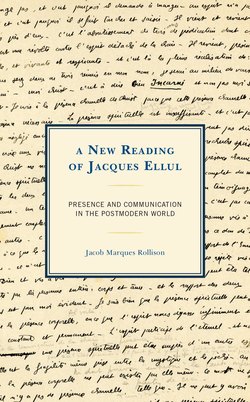Читать книгу A New Reading of Jacques Ellul - Jacob Marques Rollison - Страница 8
Introduction
ОглавлениеOn Trying to Speak in Babel
The contemporary West is marked by the breakdown of communication at the highest institutional level.[1] There is no need to imagine some past golden age in which all parties existed in harmonious agreement; recent events have amply demonstrated the malfunctioning of the legal and communicative frameworks which structure communal western life. Indeed, a prominent law professor interprets the degraded status of verbal reasoning in our political processes as part of “the perfect verdict on our times.”[2] Jonathan Turley, Shapiro Professor of Public Interest Law at George Washington University, laments the egregious misuse of his own testimony (and the figure of James Madison, on whom Turley is an expert) by both political parties in the presidential impeachment trial in early 2020. Turley’s words were ripped from their original context, separated from his intentions and conscripted simultaneously into opposing sides in a political war: “It was the first entirely dubbed trial where advocates simply supplied the words that fit with their case rather than reality.” He described the “real takeaway” of the trial thus: “It really did not matter what anyone had to say.” Turley saw neither communicative speech nor active listening in the event, writing that “The trial was like watching a movie where the audience heard only the lines that they came to hear,” and “the trial could have had the sound turned off for the purposes of most viewers.”
These mediatized descriptions in Turley’s account merit attention. He notes the unfortunate role played by news and cable networks, who construct and transmit simple, contradiction-free narratives telling their target audience precisely what they want to hear. It is worth asking to what extent Turley’s experience—of having one’s words and images turned against one’s own intentions—is simply one instance of generalized communicative conditions in a society deeply impacted by the invention of the camera and the tape recorder. But most importantly, Hurley highlights the crucial role of representation in such a trial. If anyone is to blame for this lack of communication, it is the people, the viewers, us: “We are all to blame.” In this televised “echo-journalism,” the words show trial take on a more literal and visible meaning than ever before. As a lawyer, Turley describes what he sees as an unfortunately accurate case of political representation. In his account, the impeachment trial (and the government as a whole) portrays a divided American people closed off to discussion, for whom a string of incommunicative bipartisan accusations and blocked ears replaces any careful consideration of argument, evidence, or dialogue.
If Turley’s description is taken as a “sign of the times”—giving this term the full theological weight implied in Christ’s usage thereof (Matt 16:3)—the question of how to interpret this sign naturally follows. As Christ’s statement points back to the prophet Jonah, the present essay will seek an interpretive guide in the writings of a modern-day prophet, the twentieth-century French historian of institutions and theological ethicist Jacques Ellul.
To diagnose and respond to these communicative crises, this book proposes an original reading of Ellul’s works, focusing on the theme of presence as a potential resource for theological communication ethics for the present time. Ellul’s use of this tricky term (which I will address below) spans his entire oeuvre, which he intended as an ensemble to be grasped as a whole. In addition to offering resources for contemporary theological communication ethics, examining this theme allows us to understand Ellul’s corpus in a new way. Analyzing this term in Ellul’s work brings out his important but overlooked response to a generation of thinkers with their own complex and critical relations to the term ‘presence’—Michel Foucault, Jacques Derrida, Jacques Lacan, Gilles Deleuze, and other French intellectuals in the nineteen-sixties and seventies, who were more or less associated with terms such as “structuralist,” “poststructuralist,” or “postmodern.” Because this generation of thinkers has been highly influential in much subsequent Anglophone academic theology, drawing out Ellul’s response provides a critical foil for examining other theological responses and appropriations of these thinkers’ work. I argue that giving Ellul a new hearing can make a fruitful intervention in these theological and communicative conversations. My whole study attempts to avoid what Kierkegaard called “the basic error of modern times”: “that everywhere people are occupied with the what they are to communicate—not with what communication is.”[3]
In the remainder of this introduction, I will briefly describe the reception of this twentieth-century French thought in anglophone theology, show why Ellul is a helpful figure to help us explore this relation, and offer some clues as to what ‘presence’ might mean for Ellul.
